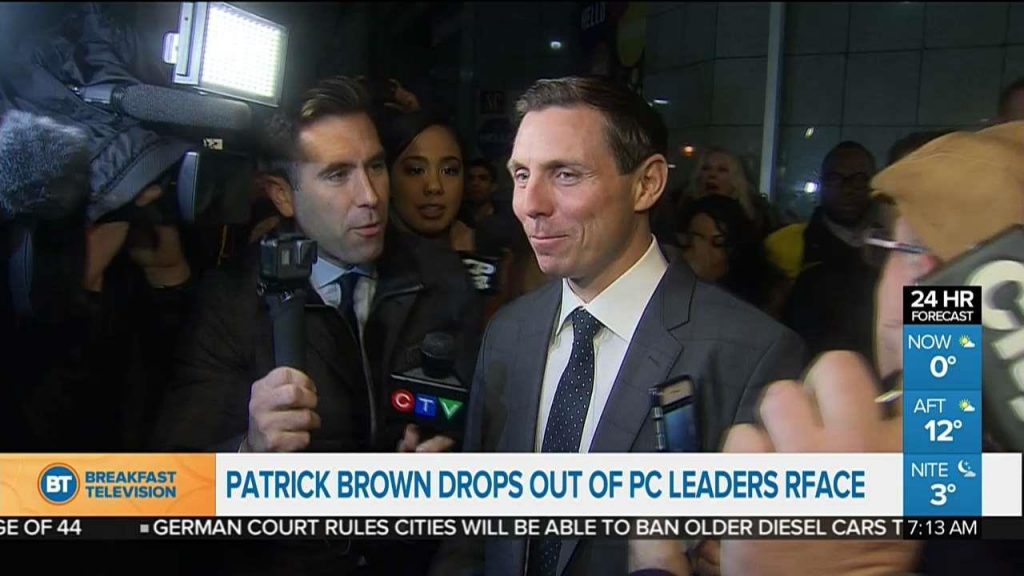Blog Post
Patrick Brown is gone. Here’s what’s next.
By Jonathon Van Maren
So Patrick Brown, who was forced from the leadership of the Progressive Conservative Party back in January over allegations of sexual misconduct, and then resurfaced to join the leadership race to replace himself, has now resigned from that race, citing pressures on his family and the strain of having to battle the growing body of allegations against himself while also attempting to snatch back the position he says was snatched from him. Brown’s play for a comeback does not seem to have hit the party too badly in the polls as of yet, but did cause utter chaos as his reappearance caused a rift in the party between those who considered him toxic and corrupt, and those who felt he’d been the victim of a media hatchet-job—or, for those who prefer conspiracy theories, a coup facilitated by his enemies inside the party.
I genuinely thought that Brown had a shot at winning the leadership. The #MeToo movement has begun to attract the ire of commentators and the public alike, with many (if not most) beginning to grumble that the accusations and subsequent purges were going too far. Brown managed to cleverly position himself as an upstanding and innocent man (one with sisters and a grandmother who loved him, no less!) who was fighting an uphill battle against forces that wanted to destroy his hitherto pristine reputation. That was a message that was resonating with a lot of people before he suddenly decided to exit the race, and there’s no telling if he might have pulled it off. It probably would have torn the party apart, but that doesn’t mean he wouldn’t have won. Brown, while claiming to be in support of #MeToo, could have been a potent anti-#MeToo candidate, and there are plenty of voters, some who even disliked him, who might have seen a vote for him as a repudiation of that movement
But now, finally, he seems to be gone—although admittedly, I write that while nervously checking Twitter just in case he’s decided to resurface again. After all, he dropped 100 grand to get into the race, so he obviously planned to stick it out, at least at some point. Perhaps Ontario voters will be spared his toxic presence from here on out—or at least, he can be relegated to Barrie and whatever remote backbench the future leader decides to banish him to if his nomination papers actually end up getting signed. As I said before, good riddance—Brown was a thoroughly corrupt and self-interested chameleon who proved over and over again that he would do whatever it took, at whatever cost to anybody else, to attain power.
Which leaves us with a handful of leadership candidates who now actually have the opportunity to pitch their platforms: Caroline Mulroney, the daughter of former prime minister Brian Mulroney, Christine Elliot, the wife of the late finance minister Jim Flaherty, Doug Ford, the brother of the late Mayor Rob Ford, and Tanya Granic Allen, the head of Parents as First Educators (PAFE.) As usual, the pro-life political organization Right Now has done an excellent job profiling each of the candidates, ranking them according to their pro-life convictions and commitments, and putting forward some very helpful recommendations for pro-lifer voters. Their ranking (which can be found here—I encourage you all to check it out), advises voters to rank the candidates as follows: Allen, Ford, Elliot, and Mulroney. I will be following their advice.
I’ve been very impressed with Tanya Granic Allen’s performance during interviews and the first leadership debate, for which she received surprised kudos from many commentators who were initially inclined to write her off. Debating on TV—which I’ve done a few times—isn’t as easy as it looks, and Allen proved that she was willing to call out other candidates and state her principles articulately and passionately. Even Conrad Black, who unfortunately does not let his personal pro-life convictions guide his political endorsements, had some admiring words for her:
I would also like to add a word of appreciation for Tanya Granic Allen. I would not recommend her as party leader. But in these times the presence of an articulate, fearless, and sane upholder of the sanctity of life from the hair-trigger abortionists, euthanasia-enthusiasts, suicide-routinists, and those nostalgic for capital punishment, and an abstainer from the view that any mention of theism is counter-inclusive and sullies the rites of state with the superstition of church, is welcome. Indeed almost, if I may, a Godsend.
Doug Ford also told Right Now that he is pro-life, and that he is on board with legislation that would require parental consent for minors seeking an abortion. This is very encouraging. For all members of the Progressive Conservative Party, I reiterate: Please visit Right Now’s rankings, and do make sure that you get out and vote. Patrick Brown is gone at last, but we need to make sure that social conservative voices are heard in choosing his replacement.
________________________________________
For anyone interested, my book on The Culture War, which analyzes the journey our culture has taken from the way it was to the way it is and examines the Sexual Revolution, hook-up culture, the rise of the porn plague, abortion, commodity culture, euthanasia, and the gay rights movement, is available for sale here.









Good article. I’ll just note that, contrary to widespread perception, Brown wasn’t actually forced out as leader. In the Canadian parliamentary system, caucus does not have the right or ability to fire party leaders. He resigned, albeit under the threat of a caucus letter demanding his resignation.
It might be a subtle difference, since it’s hard to imagine a leader moving forward with no caucus support. However, I think it’s an important distinction. For example, in Brown’s case, I think if he would have waited for the caucus to issue its letter, he could have bought himself some time. For one thing, not all caucus members were at the conference call where the threat of the letter was made. So, getting unanimity might have taken some time, or it might not have even come.
Nevertheless, he’s now out again, which is definitely better for the party, as well as the province.